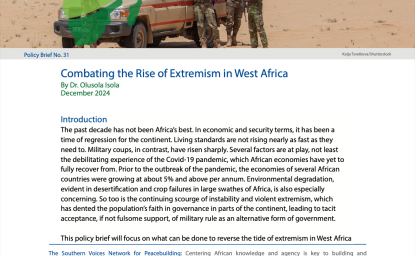Lessons, Credibility and Priorities for Afghanistan
Ending a war well requires an accurate assessment of the facts, careful weighing of the potential costs, and plans for achieving the desired outcomes and dealing with unexpected repercussions.
Ending a war well requires an accurate assessment of the facts, careful weighing of the potential costs, and plans for achieving the desired outcomes and dealing with unexpected repercussions.

There will be plenty of re-examination of the U.S. decision in April to give a September date certain for pulling out of Afghanistan, but events over the last few months make clear that the final U.S. decisions were based on a poor understanding of the damage already done to Afghan government morale, authority, and capacity by the U.S. negotiations with the Taliban, during the last two years of the Trump administration. The Taliban had used the last two years while negotiating with the United States to strengthen their political and military position in Afghanistan, building on grievances around the country and the political space created by divisions among Kabul leaders, as well as persistent corruption and poor governance at many levels, including in parts of the security services. The United States effectively reduced the credibility of the Kabul government by the way it conducted the negotiations with the Taliban and the follow-on treatment of the Kabul government. Trump’s repeated insistence on pulling out U.S. troops reinforced the demoralizing messages.
There were many analyses and studies that warned that this was happening which offered alternative recommendations, but they were not heeded or accepted during the Trump administration or by the new Biden team. Following the April decision to withdraw, the U.S. administration continued to badly undermine Afghan morale with public messaging designed for a U.S. domestic audience about how the Afghan conflict was not winnable. This strongly affected the views and morale of Afghan civilians, military, and local governments. The United States promised continued diplomatic, economic and defense support for Afghanistan during and after the troop departure, but it did not take clear and concrete steps to demonstrate that support, which would have boosted the will of those resisting the Taliban. For those watching closely in the United States or in Afghanistan, it was hard to detect any priority effort to provide additional support to Kabul. Instead, the United States rushed to pull out its presence in ways that severely weakened and hobbled the ability of Afghan security forces to fight the Taliban. Key elements of those forces had not been trained to fight the Taliban without close U.S. air support or the technical support to keep aircraft flying. Suddenly withdrawing that military/contractor support badly undermined the ability of the Afghan Airforce, which did not have sufficiently trained personnel or parts to fill in the gaps. This in turn undermined the ability of well-trained Afghan special forces to respond to needs around the country. Local Afghan units in various parts of the country were left feeling isolated and abandoned. These problems were highlighted in commentaries and public messages, including from European allies, and no doubt, they were reflected in private discussions and briefings among U.S. officials during recent months. There should have been greater realization of the devastating toll this would take.
There is little doubt that the U.S. handling of this withdrawal has fed the narrative of America’s rivals and critics that the United States is a declining power and one that cannot be trusted to follow through on its commitments. Those rivals and critics will also try to use this chain of events to undermine the Biden Administration’s focus on strengthening U.S. partnerships and alliances and his efforts to rally support for democracy and human rights around the world. As one former West European Foreign Minister commented privately, “it looks like the U.S. is losing a lot of power and credibility rapidly.”
The steps the U.S. administration takes and the messages it sends in the days, weeks, and months ahead are extremely important. Indicators to watch for that will reveal the effectiveness, trustworthiness, and credibility of the United States include:
These signposts should include a solid strategy to establish clear-eyed and effective relations with the new Taliban-dominated government. The United States must take steps to rally other nations to a united approach to these issues, including for action by the United Nations and the use of various types of sanctions and sweeteners as leverage to encourage good behavior by the Taliban and to raise the costs for bad behavior. The United States will need to try to bring together in a common approach its partners, rivals, and concerned neighboring countries, including Pakistan and Iran, who have divergent interests and policies from Washington’s. This will be a major test for U.S. diplomacy and needs to have a much higher priority than it was given in recent months.
Steps to assure U.S. security: Over the medium term, the U.S. administration will need to demonstrate that it has the capacity to monitor accurately potentially threatening activity by terrorists and radicals in Afghanistan and to act as needed to protect U.S. targets in the region and beyond from attack. With Al-Qaida still maintaining a presence and a relationship with the Taliban and other terrorist groups present in Afghanistan, this should be an ongoing concern for homeland security too. It is far from clear that the United States has effective capacity any longer in the region at present.
Securing Kabul Airport and Providing Evacuation for those most endangered: As we are seeing in the news, this is a very complicated and risk fraught undertaking, but one that is essential to protect Americans, current and former Afghan employees of the U.S. government, civil society figures and former government officials who worked with the United States and who are now in danger. This will be a very complex operation on the ground in Kabul and will involve working with the Taliban to secure free passage to the airport, as well as to manage the flows of frightened Afghans seeking to flee. In addition, the United States needs to urgently work through the U.S. bureaucratic steps needed to screen those seeking the various types of entry into the United States, whether it be via the Special Immigrant Visas for former interpreters, or the wider category of refugee admissions (P2) recently opened for Afghanistan, and which remains very burdensome. The United States should also consider a humanitarian parole for Afghans. Other governments and non-Afghan NGOS and Organizations are also seeking to arrange their own evacuation flights which need to be coordinated with and would be facilitated by a longer U.S. control at the Kabul airport.
Establishing Protection Mechanisms for those the Taliban may persecute: There are already reports of Taliban going door to door encouraging people to identify those who worked for the former Afghan government and who were active in anti-Taliban activities, including support of women’s rights and a free press. Such individuals were already the subject of a previous Taliban assassination campaign and now could be arrested or otherwise punished under a Taliban-dominated regime. Setting up such a protection system will need close cooperation with international partners, including the United Nations and other international organizations. An international coalition will need to establish a protection framework to coordinate carefully both essential steps and messaging to have the best chance of influencing the behavior of a Taliban-dominated government. Actions by and messages from the UN Security Council can be important here. Also, the new Afghan government will need funds to function. The outgoing government received some 80% of its funding from the international community and the new government will need to deal with even more serious economic, health, and humanitarian challenges as well as keep basic government services running.
Meeting Humanitarian Needs: Specific steps will be crucial to meet the needs of the hundreds of thousands of Afghans who fled the fighting around Afghanistan this year with little more than the clothes on their backs. These new flows of internally displaced persons come on top of the World Bank’s already strong efforts to provide greater humanitarian support for the effects of COVID 19 on people midst the sustained conflict around Afghanistan. The International Community and humanitarian NGOs will be trying to reach agreements with the new Afghan authorities and organize food, shelter, and health care for those in need.
Establishing modus vivendi with the Taliban and whatever new government emerges: To take such important practical steps, the United States and others will need to establish working relations with the new Taliban authorities and any new government of national unity that emerges. The United States has clearly been holding some dialogue with the Taliban in Doha, but that has not been very transparent. The challenge now is to regularize channels of communication and to make them as fruitful as possible, in a situation where the Taliban still feels the momentum of its victories.
Earl Anthony Wayne, worked on Afghanistan from 2009-2010 as Deputy Ambassador and Coordinator for Development and from 2001-2003 as Assistant Secretary of State for Economic and Business Affairs. He is a Public Policy Fellow at the Woodrow Wilson Center and a Distinguished Diplomat in Residence at American University’s School of International Service.


The Indo-Pacific Program promotes policy debate and intellectual discussions on US interests in the Asia-Pacific as well as political, economic, security, and social issues relating to the world’s most populous and economically dynamic region. Read more


